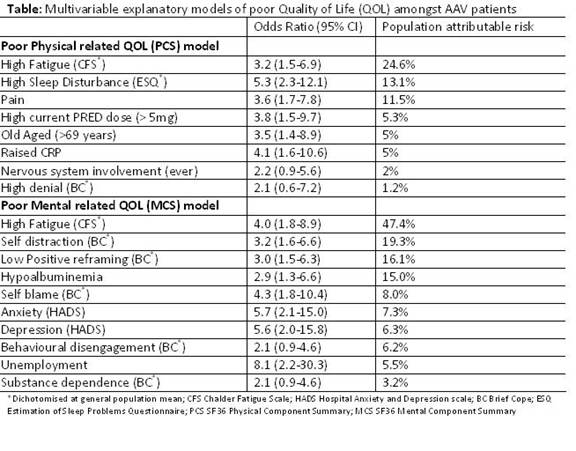Determinants of Poor Quality of Life in ANCA Associated Vasculitis (AAV)
Background/Purpose : Patients with ANCA associated vasculitis (AAV) report significantly reduced quality of life (QOL), however the precise causes of such impairments are poorly understood.
This large study aimed to identify the determinants of poor QOL amongst AAV patients with view to informing future interventions designed to modify this crucial outcome.
Methods : A cross-sectional study was conducted. AAV cases were recruited from rheumatology and renal departments across the UK according to consecutive clinic attendance and classified using the EMEA vasculitis algorithm. Participants completed a questionnaire which determined physical- and mental-health related QOL (SF36 physical and mental component summary scores; PCS and MCS, respectively). In addition, data on putative psychosocial determinants of poor QOL was collected, including depression, anxiety (Hospital and Anxiety Depression Scale), fatigue (Chalder Fatigue Scale), sleep disturbance (Estimation of sleep problems questionnaire), coping (Brief Cope) and pain (body manikins). Concurrently, putative clinical determinants were measured, including assessments of disease activity (Birmingham Vasculitis Activity Score 3, BVAS), disease damage (Vasculitis Damage Index), co-morbidity (Charlson index), immunosuppressant exposure, laboratory tests (ANCA, haemoglobin, albumin, renal function, CRP) and system involvement. Measures were categorised and 2 multivariable explanatory models of poor PCS and MCS (defined as scores below general population mean) were developed using forward stepwise logistic regression. The relative importance, in population terms, of the identified associations was further quantified using population attributable risks.
Results: Of 486 invited patients, 410 participated (86%): 49% male, median age 63.5 years (Inter-quartile range 51.8-72.4 years), 19.3% recording active disease (BVAS>0). The final multivariable models identified a number of clinical and psychosocial factors found to be independently and significantly associated with poor PCS and MCS (Table). Fatigue was the only factor to be independently associated with both PCS and MCS and was also, by far, the greatest contributor to poor QOL in population terms across both models.
Conclusion : Poor QOL amongst AAV patients is determined by multiple clinical and psychosocial factors, however, fatigue appears to be the most important. Clinically, optimal control of underlying inflammation and neurological manifestations are likely to improve aspects of QOL, however multidisciplinary interventions targeting psychosocial determinants may offer even greater gains. Further work is required to develop treatment strategies specific to alleviating fatigue.
Disclosure:
N. Basu,
None;
A. McClean,
None;
R. A. Luqmani,
None;
L. Harper,
None;
O. Flossmann,
None;
D. Jayne,
None;
M. Little,
None;
E. N. Amft,
None;
N. Dhaun,
None;
J. McLaren,
None;
V. Kumar,
None;
L. Erwig,
None;
G. T. Jones,
None;
D. M. Reid,
None;
G. J. Macfarlane,
None.
« Back to 2012 ACR/ARHP Annual Meeting
ACR Meeting Abstracts - https://acrabstracts.org/abstract/determinants-of-poor-quality-of-life-in-anca-associated-vasculitis-aav/

